Unit 5 Do you have a soccer ball?单元复习课件
文档属性
| 名称 | Unit 5 Do you have a soccer ball?单元复习课件 | 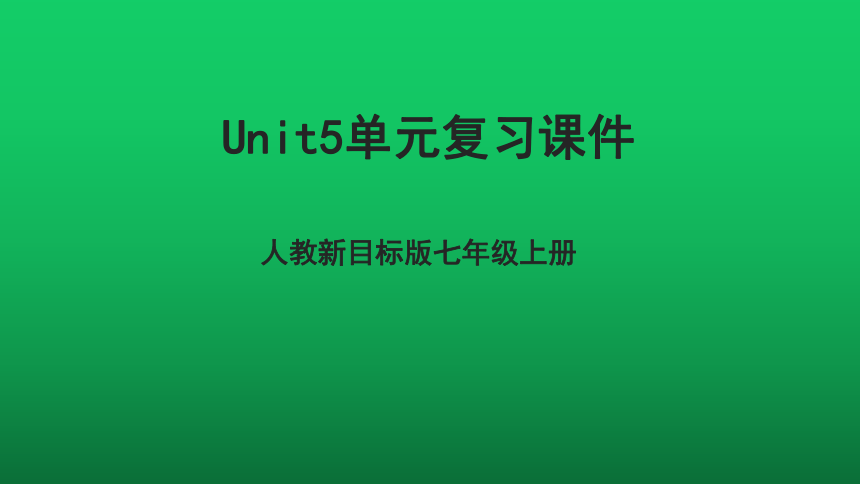 | |
| 格式 | zip | ||
| 文件大小 | 1.8MB | ||
| 资源类型 | 试卷 | ||
| 版本资源 | 人教新目标(Go for it)版 | ||
| 科目 | 英语 | ||
| 更新时间 | 2022-12-16 16:26:41 | ||
图片预览

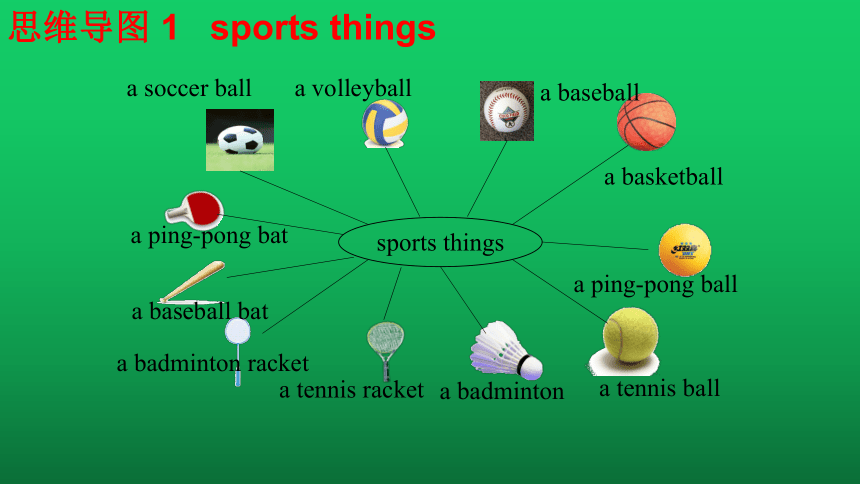
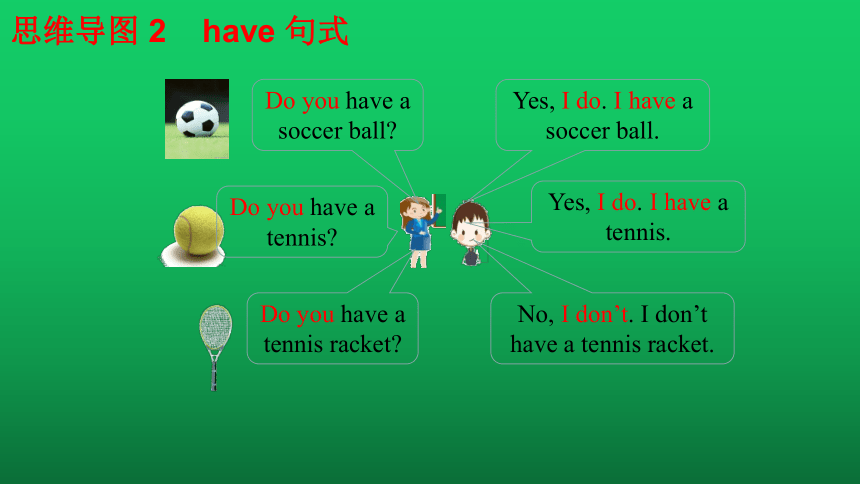
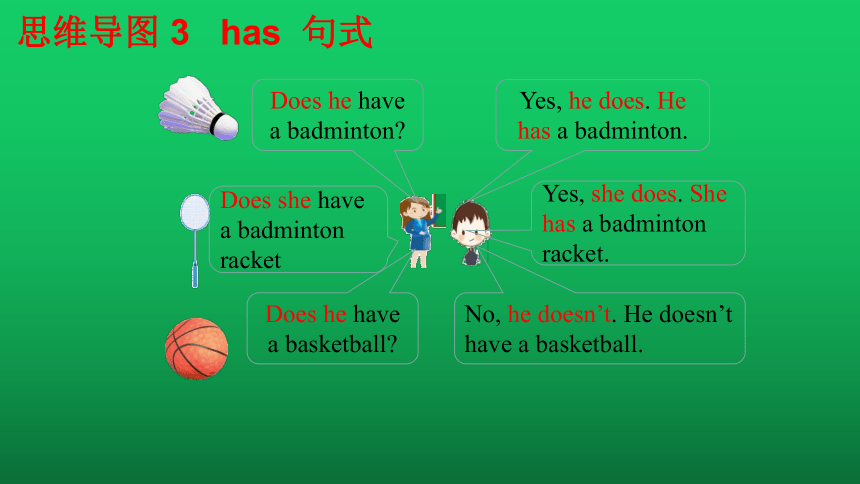
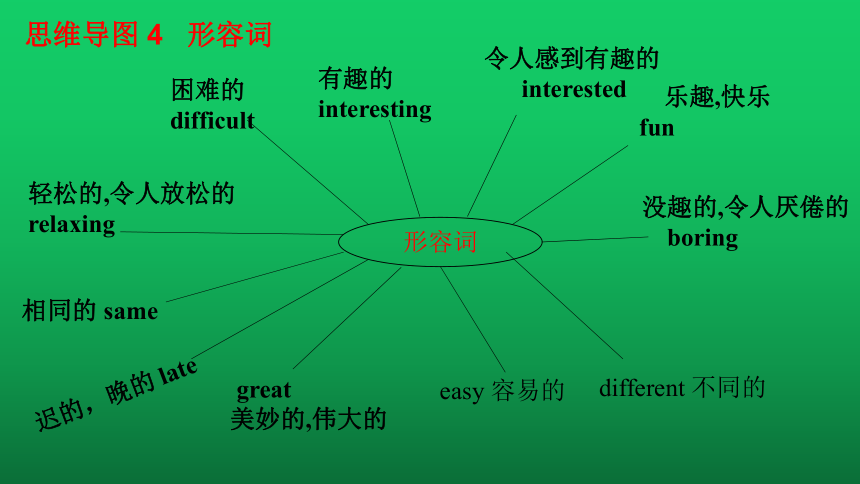
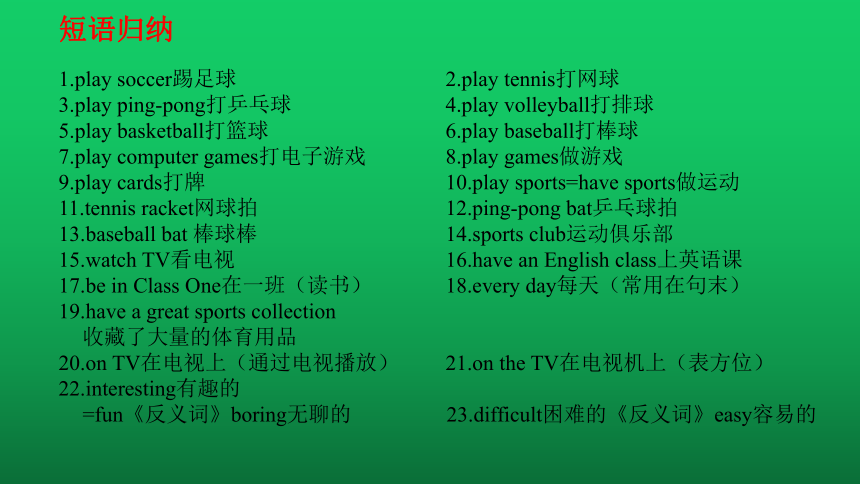
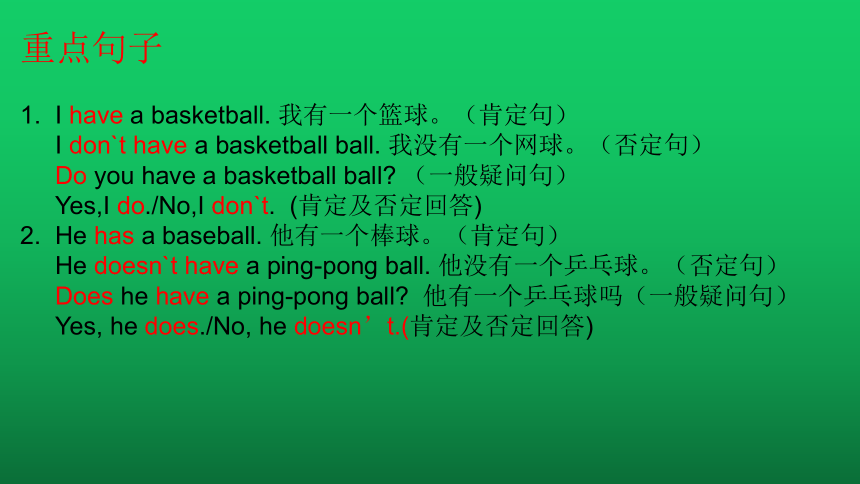
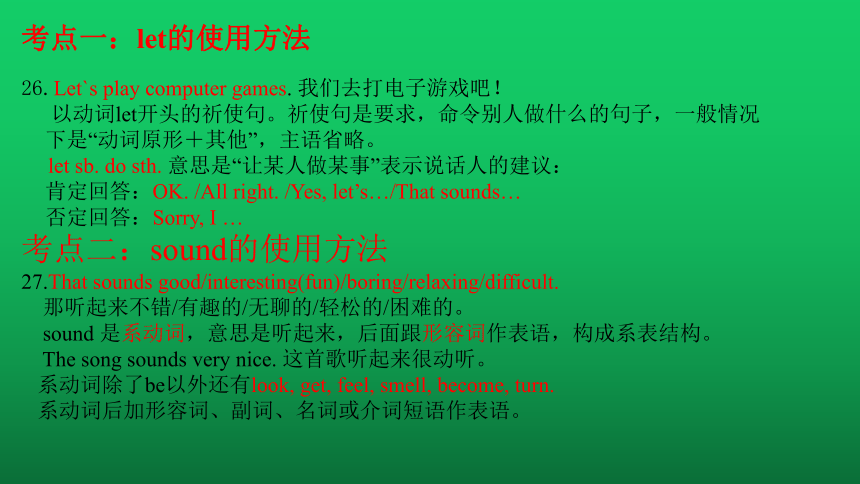
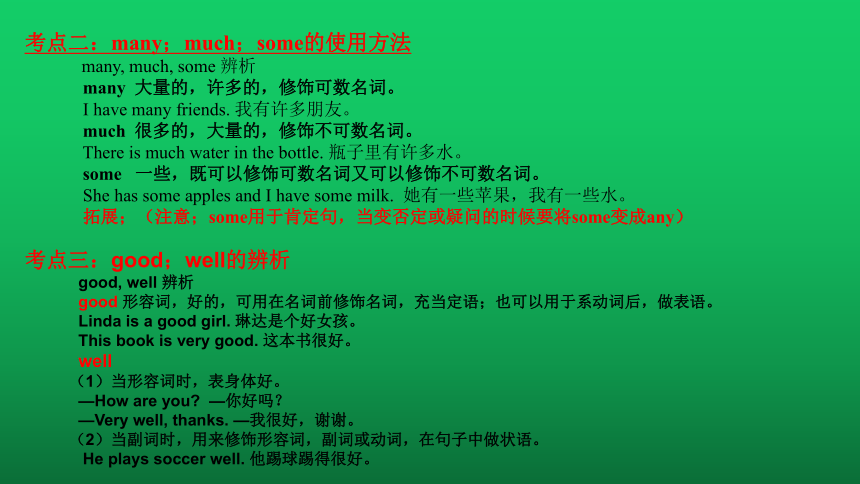
文档简介
(共20张PPT)
Unit5单元复习课件
人教新目标版七年级上册
sports things
a soccer ball
a volleyball
a baseball
a basketball
a ping-pong ball
a tennis ball
a badminton
a tennis racket
a badminton racket
a baseball bat
a ping-pong bat
思维导图 1 sports things
Do you have a soccer ball
Yes, I do. I have a soccer ball.
Do you have a tennis
Yes, I do. I have a tennis.
Do you have a tennis racket
No, I don’t. I don’t have a tennis racket.
思维导图 2 have 句式
Does he have a badminton
Yes, he does. He has a badminton.
Does she have a badminton racket
Yes, she does. She has a badminton racket.
Does he have a basketball
No, he doesn’t. He doesn’t have a basketball.
思维导图 3 has 句式
形容词
困难的 difficult
有趣的interesting
令人感到有趣的
interested
乐趣,快乐 fun
没趣的,令人厌倦的
boring
different 不同的
easy 容易的
great
美妙的,伟大的
迟的,晚的 late
相同的 same
轻松的,令人放松的 relaxing
思维导图 4 形容词
短语归纳
1.play soccer踢足球 2.play tennis打网球
3.play ping-pong打乒乓球 4.play volleyball打排球
5.play basketball打篮球 6.play baseball打棒球
7.play computer games打电子游戏 8.play games做游戏
9.play cards打牌 10.play sports=have sports做运动
11.tennis racket网球拍 12.ping-pong bat乒乓球拍
13.baseball bat 棒球棒 14.sports club运动俱乐部
15.watch TV看电视 16.have an English class上英语课
17.be in Class One在一班(读书) 18.every day每天(常用在句末)
19.have a great sports collection
收藏了大量的体育用品
20.on TV在电视上(通过电视播放) 21.on the TV在电视机上(表方位)
22.interesting有趣的
=fun《反义词》boring无聊的 23.difficult困难的《反义词》easy容易的
重点句子
1. I have a basketball. 我有一个篮球。(肯定句)
I don`t have a basketball ball. 我没有一个网球。(否定句)
Do you have a basketball ball (一般疑问句)
Yes,I do./No,I don`t. (肯定及否定回答)
2. He has a baseball. 他有一个棒球。(肯定句)
He doesn`t have a ping-pong ball. 他没有一个乒乓球。(否定句)
Does he have a ping-pong ball 他有一个乒乓球吗(一般疑问句)
Yes, he does./No, he doesn’t.(肯定及否定回答)
考点一:let的使用方法
26.Let`s play computer games. 我们去打电子游戏吧!
以动词let开头的祈使句。祈使句是要求,命令别人做什么的句子,一般情况
下是“动词原形+其他”,主语省略。
let sb. do sth. 意思是“让某人做某事”表示说话人的建议:
肯定回答:OK. /All right. /Yes, let’s…/That sounds…
否定回答:Sorry, I …
考点二:sound的使用方法
27.That sounds good/interesting(fun)/boring/relaxing/difficult.
那听起来不错/有趣的/无聊的/轻松的/困难的。
sound 是系动词,意思是听起来,后面跟形容词作表语,构成系表结构。
The song sounds very nice. 这首歌听起来很动听。
系动词除了be以外还有look, get, feel, smell, become, turn.
系动词后加形容词、副词、名词或介词短语作表语。
考点二:many;much;some的使用方法
many, much, some 辨析
many 大量的,许多的,修饰可数名词。
I have many friends. 我有许多朋友。
much 很多的,大量的,修饰不可数名词。
There is much water in the bottle. 瓶子里有许多水。
some 一些,既可以修饰可数名词又可以修饰不可数名词。
She has some apples and I have some milk. 她有一些苹果,我有一些水。
拓展;(注意;some用于肯定句,当变否定或疑问的时候要将some变成any)
考点三:good;well的辨析
good, well 辨析
good 形容词,好的,可用在名词前修饰名词,充当定语;也可以用于系动词后,做表语。
Linda is a good girl. 琳达是个好女孩。
This book is very good. 这本书很好。
well
(1)当形容词时,表身体好。
—How are you —你好吗?
—Very well, thanks. —我很好,谢谢。
(2)当副词时,用来修饰形容词,副词或动词,在句子中做状语。
He plays soccer well. 他踢球踢得很好。
考点五:and;but;or辨析
and 连词,和,又表示语气的并列或递进。
I can sing and dance. 我会唱歌和跳舞。
but 连词但是表示语气的转折。
He can sing but he can’t dance. 他会唱歌但不会跳舞。
or表选择
Do you like basketball or baseball
考点六:everyday;every day
every day, everyday辨析
every day 每天,在句子中做状语。
I go to school every day.我每天上学。
My father watches TV every day. 我父亲天天看电视。
everyday 形容词,日常的,只能做定语。
everyday life 日常生活
I speak everyday English every day. 我每天都说英语的日常交际用语。
(1)句式; S + V+.... ,句中不能出现be动词,反之,
句式:S + be +...的句子,句中也不能出现实义动词。
e.g:The book is on the desk, 数在课桌上。
We are sister and brother. 我们是兄妹。
I need my pen. 我需要我的钢笔。
They have a set of keys,他们有一串钥匙。
(2)含有实义动词的句子,当主语为非第三人称单数时,动词用原形;而当主语为第三人称单数时,动词要用三单线形式。
e.g: I have a pen.
We take the books to his sister.
They need a map.
He has a ping-pong ball.
My father likes English
语法知识:
人称代词
人称代词的主格和宾格
人称代词 单数 复数 主格 宾格 主格 宾格
第一人称 I 我 me we 我们 us
第二人称 you 你 you you 你们 you
第三人称 he 他 him they 他们/她们/它们 them
she 她 her it 它 it 第三人称单数的具体内容
① 人称代词:he she it
② 指示代词:this that
③ 单一的人名或地名:Mary,Li Yundi,
China(中国), Beijing
④ 所有的单数名词:myfather,his pen, Jim's sister,
my parent, English, her name
⑤ 表算术的短语:
two and two(二加二)three and six(三加六)
当主语为第三人称单数时,实义动词的变化规则。(简称“动词的三单形式”)
一般现在时(三单形式)
规则:
一般在词尾加 S, make-makes, help-helps
以s.x.ch,sh 结尾的动词在词尾加 es, teach-teaches; watch-watches
以o结尾的动词在词尾加 es, go-goes, do-does
以辅音字母+y 结尾的动词,变y为i再加 es, study-studies, fly-flies
不规则变化 have-has, be-is
“动词的三单形式”
I'm nice ________ (meet) you
Let us ________(play) baketball
They want __________ (go) home
What about__________ (play) ping-pong
Thanks for _________(help) me
Tom _______ (ask) me"What's this "
Li Lei ______ (think) Ms Xu is a teacher
Anna _______ ( want ) to play volleyball
to meet
play
to go
playing
helping
asks
thinks
wants
巩固练习
用词的适当形式填空
1. I only watch ________( they) on TV.
2. Let's watch TV with______( we) friends.
3. His parents love________( sport) very much.
4. DoesJim________( have) a baseball
5. Lucy_______( play) sports every afternoon.
6. Let's _______( play) computer games.
7. Let me________ ( ask) him for your dictionary.
8. My sister________ ( not like) sports.
9.1 have two baseball_______ (bat).
10.That______ (sound) boring.
them
my
sports
have
plays
play
ask
doesn’t like
bats
sounds
A: ________ me, ______ you have ping-pong bat
B: No, I ______.
A: ______ Tom _____ a ping-pong bat
B: No, he ______ _______ a ping-pong bat.
A: _____ Linda have a ping-pong bat
B: Yes, she_____ a ping-pong bat, ____ she doesn’t ______ a ping-pong ball.
A: Well, ____ you have a ping-pong ball
B: Yes, I ____. I _____ three ping-pong ______.
Excuse
do
don’t
Does
have
doesn’t have
Does
has
but
have
do
do
have
balls
读对话,填上正确的单词
句型转换(按要求变化句型)
1. I have a computer. (改为一般疑问句,并作肯定回答)
______ you ________ a computer -Yes, i do
2. We have a soccer ball. ( 改为否定句)
We _______ _______ a soccer ball.
3. Sue has a small sports collection. (改为否 定句)
Sue_______ ________ a small sports col lection.
4. Ann has a brother. (改为-般疑问句)
_______Ann ______ a brother
5. Do they like eggs (作肯定回答)
______ , _____ _______
Do
have
don’t
have
doesn’t
have
Does
have
Yes
they
do
翻译句子
1.下课后,我跟我的同班同学一起打乒乓球。
_______ class, | play ______________ _______ my classmates.
2.我只是在电视_上观看运动节目。
| ________ watch them _____T V
3.我的弟弟和我在同一所学校。
My brother and____ ______ _____ _______ _______ ________
4.我们迟到了.
________________________________________________
5.我没有足球,但是我的弟弟有。
-_______________________________________________________
6.足球对我来说不容易。
___________________________________________________
After
ping-pong
with
only
on
I
We are late
I don’t have football, but my brother does
It is not easy for me to play football
are
in
the
same
school
人称代词
人称代词的主格和宾格
人称代词 单数 复数 主格 宾格 主格 宾格
第一人称 I 我 me we 我们 us
第二人称 you 你 you you 你们 you
第三人称 he 他 him they 他们/她们/它们 them
she 她 her it 它 it
Unit5单元复习课件
人教新目标版七年级上册
sports things
a soccer ball
a volleyball
a baseball
a basketball
a ping-pong ball
a tennis ball
a badminton
a tennis racket
a badminton racket
a baseball bat
a ping-pong bat
思维导图 1 sports things
Do you have a soccer ball
Yes, I do. I have a soccer ball.
Do you have a tennis
Yes, I do. I have a tennis.
Do you have a tennis racket
No, I don’t. I don’t have a tennis racket.
思维导图 2 have 句式
Does he have a badminton
Yes, he does. He has a badminton.
Does she have a badminton racket
Yes, she does. She has a badminton racket.
Does he have a basketball
No, he doesn’t. He doesn’t have a basketball.
思维导图 3 has 句式
形容词
困难的 difficult
有趣的interesting
令人感到有趣的
interested
乐趣,快乐 fun
没趣的,令人厌倦的
boring
different 不同的
easy 容易的
great
美妙的,伟大的
迟的,晚的 late
相同的 same
轻松的,令人放松的 relaxing
思维导图 4 形容词
短语归纳
1.play soccer踢足球 2.play tennis打网球
3.play ping-pong打乒乓球 4.play volleyball打排球
5.play basketball打篮球 6.play baseball打棒球
7.play computer games打电子游戏 8.play games做游戏
9.play cards打牌 10.play sports=have sports做运动
11.tennis racket网球拍 12.ping-pong bat乒乓球拍
13.baseball bat 棒球棒 14.sports club运动俱乐部
15.watch TV看电视 16.have an English class上英语课
17.be in Class One在一班(读书) 18.every day每天(常用在句末)
19.have a great sports collection
收藏了大量的体育用品
20.on TV在电视上(通过电视播放) 21.on the TV在电视机上(表方位)
22.interesting有趣的
=fun《反义词》boring无聊的 23.difficult困难的《反义词》easy容易的
重点句子
1. I have a basketball. 我有一个篮球。(肯定句)
I don`t have a basketball ball. 我没有一个网球。(否定句)
Do you have a basketball ball (一般疑问句)
Yes,I do./No,I don`t. (肯定及否定回答)
2. He has a baseball. 他有一个棒球。(肯定句)
He doesn`t have a ping-pong ball. 他没有一个乒乓球。(否定句)
Does he have a ping-pong ball 他有一个乒乓球吗(一般疑问句)
Yes, he does./No, he doesn’t.(肯定及否定回答)
考点一:let的使用方法
26.Let`s play computer games. 我们去打电子游戏吧!
以动词let开头的祈使句。祈使句是要求,命令别人做什么的句子,一般情况
下是“动词原形+其他”,主语省略。
let sb. do sth. 意思是“让某人做某事”表示说话人的建议:
肯定回答:OK. /All right. /Yes, let’s…/That sounds…
否定回答:Sorry, I …
考点二:sound的使用方法
27.That sounds good/interesting(fun)/boring/relaxing/difficult.
那听起来不错/有趣的/无聊的/轻松的/困难的。
sound 是系动词,意思是听起来,后面跟形容词作表语,构成系表结构。
The song sounds very nice. 这首歌听起来很动听。
系动词除了be以外还有look, get, feel, smell, become, turn.
系动词后加形容词、副词、名词或介词短语作表语。
考点二:many;much;some的使用方法
many, much, some 辨析
many 大量的,许多的,修饰可数名词。
I have many friends. 我有许多朋友。
much 很多的,大量的,修饰不可数名词。
There is much water in the bottle. 瓶子里有许多水。
some 一些,既可以修饰可数名词又可以修饰不可数名词。
She has some apples and I have some milk. 她有一些苹果,我有一些水。
拓展;(注意;some用于肯定句,当变否定或疑问的时候要将some变成any)
考点三:good;well的辨析
good, well 辨析
good 形容词,好的,可用在名词前修饰名词,充当定语;也可以用于系动词后,做表语。
Linda is a good girl. 琳达是个好女孩。
This book is very good. 这本书很好。
well
(1)当形容词时,表身体好。
—How are you —你好吗?
—Very well, thanks. —我很好,谢谢。
(2)当副词时,用来修饰形容词,副词或动词,在句子中做状语。
He plays soccer well. 他踢球踢得很好。
考点五:and;but;or辨析
and 连词,和,又表示语气的并列或递进。
I can sing and dance. 我会唱歌和跳舞。
but 连词但是表示语气的转折。
He can sing but he can’t dance. 他会唱歌但不会跳舞。
or表选择
Do you like basketball or baseball
考点六:everyday;every day
every day, everyday辨析
every day 每天,在句子中做状语。
I go to school every day.我每天上学。
My father watches TV every day. 我父亲天天看电视。
everyday 形容词,日常的,只能做定语。
everyday life 日常生活
I speak everyday English every day. 我每天都说英语的日常交际用语。
(1)句式; S + V+.... ,句中不能出现be动词,反之,
句式:S + be +...的句子,句中也不能出现实义动词。
e.g:The book is on the desk, 数在课桌上。
We are sister and brother. 我们是兄妹。
I need my pen. 我需要我的钢笔。
They have a set of keys,他们有一串钥匙。
(2)含有实义动词的句子,当主语为非第三人称单数时,动词用原形;而当主语为第三人称单数时,动词要用三单线形式。
e.g: I have a pen.
We take the books to his sister.
They need a map.
He has a ping-pong ball.
My father likes English
语法知识:
人称代词
人称代词的主格和宾格
人称代词 单数 复数 主格 宾格 主格 宾格
第一人称 I 我 me we 我们 us
第二人称 you 你 you you 你们 you
第三人称 he 他 him they 他们/她们/它们 them
she 她 her it 它 it 第三人称单数的具体内容
① 人称代词:he she it
② 指示代词:this that
③ 单一的人名或地名:Mary,Li Yundi,
China(中国), Beijing
④ 所有的单数名词:myfather,his pen, Jim's sister,
my parent, English, her name
⑤ 表算术的短语:
two and two(二加二)three and six(三加六)
当主语为第三人称单数时,实义动词的变化规则。(简称“动词的三单形式”)
一般现在时(三单形式)
规则:
一般在词尾加 S, make-makes, help-helps
以s.x.ch,sh 结尾的动词在词尾加 es, teach-teaches; watch-watches
以o结尾的动词在词尾加 es, go-goes, do-does
以辅音字母+y 结尾的动词,变y为i再加 es, study-studies, fly-flies
不规则变化 have-has, be-is
“动词的三单形式”
I'm nice ________ (meet) you
Let us ________(play) baketball
They want __________ (go) home
What about__________ (play) ping-pong
Thanks for _________(help) me
Tom _______ (ask) me"What's this "
Li Lei ______ (think) Ms Xu is a teacher
Anna _______ ( want ) to play volleyball
to meet
play
to go
playing
helping
asks
thinks
wants
巩固练习
用词的适当形式填空
1. I only watch ________( they) on TV.
2. Let's watch TV with______( we) friends.
3. His parents love________( sport) very much.
4. DoesJim________( have) a baseball
5. Lucy_______( play) sports every afternoon.
6. Let's _______( play) computer games.
7. Let me________ ( ask) him for your dictionary.
8. My sister________ ( not like) sports.
9.1 have two baseball_______ (bat).
10.That______ (sound) boring.
them
my
sports
have
plays
play
ask
doesn’t like
bats
sounds
A: ________ me, ______ you have ping-pong bat
B: No, I ______.
A: ______ Tom _____ a ping-pong bat
B: No, he ______ _______ a ping-pong bat.
A: _____ Linda have a ping-pong bat
B: Yes, she_____ a ping-pong bat, ____ she doesn’t ______ a ping-pong ball.
A: Well, ____ you have a ping-pong ball
B: Yes, I ____. I _____ three ping-pong ______.
Excuse
do
don’t
Does
have
doesn’t have
Does
has
but
have
do
do
have
balls
读对话,填上正确的单词
句型转换(按要求变化句型)
1. I have a computer. (改为一般疑问句,并作肯定回答)
______ you ________ a computer -Yes, i do
2. We have a soccer ball. ( 改为否定句)
We _______ _______ a soccer ball.
3. Sue has a small sports collection. (改为否 定句)
Sue_______ ________ a small sports col lection.
4. Ann has a brother. (改为-般疑问句)
_______Ann ______ a brother
5. Do they like eggs (作肯定回答)
______ , _____ _______
Do
have
don’t
have
doesn’t
have
Does
have
Yes
they
do
翻译句子
1.下课后,我跟我的同班同学一起打乒乓球。
_______ class, | play ______________ _______ my classmates.
2.我只是在电视_上观看运动节目。
| ________ watch them _____T V
3.我的弟弟和我在同一所学校。
My brother and____ ______ _____ _______ _______ ________
4.我们迟到了.
________________________________________________
5.我没有足球,但是我的弟弟有。
-_______________________________________________________
6.足球对我来说不容易。
___________________________________________________
After
ping-pong
with
only
on
I
We are late
I don’t have football, but my brother does
It is not easy for me to play football
are
in
the
same
school
人称代词
人称代词的主格和宾格
人称代词 单数 复数 主格 宾格 主格 宾格
第一人称 I 我 me we 我们 us
第二人称 you 你 you you 你们 you
第三人称 he 他 him they 他们/她们/它们 them
she 她 her it 它 it
同课章节目录
- starters 预备篇(2012秋审查)
- Unit 1 Good morning !
- Unit 2 What’s this in English?
- Unit 3 What color is it ?
- Unit 1 My name's Gina.
- Section A
- Section B
- Unit 2 This is my sister.
- Section A
- Section B
- Unit 3 Is this your pencil?
- Section A
- Section B
- Unit 4 Where's my schoolbag?
- Section A
- Section B
- Unit 5 Do you have a soccer ball?
- Section A
- Section B
- Unit 6 Do you like bananas?
- Section A
- Section B
- Unit 7 How much are these socks?
- Section A
- Section B
- Unit 8 When is your birthday?
- Section A
- Section B
- Unit 9 My favorite subject is science.
- Section A
- Section B
